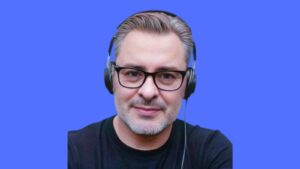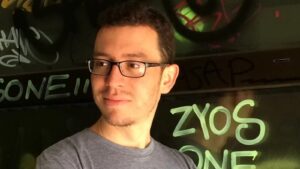Managing Director of Language Partners, based in The Netherlands
By Daniel Israel

Harald, you are a co-owner of Language Partners. Are you a linguist yourself, and how did you get into this competitive line of business?
No, I’m not a linguist; I am a historian and a business man. In 2004, my family and some other families we befriended established a small investment company. Our aim has always been to invest in small and medium enterprises, who not only need money, but knowledge and experience to make the next step as well. Preferably, we invest in companies that focus on the development of ‘human capital’. The language training institute, which we first invested in and one of the predecessors of Language Partners, ticked all the boxes. So, that’s why we made our first investment and we still are very much involved with Language Partners today.
How would you describe Language Partners?
Language Partners is a language training company, which offers language and business language training for 52 different languages in our centres in the Netherlands and internationally online. Centres in the Hague and Rotterdam are in what is called the Randstad, which happens to be where most people live in the Netherlands. Additional locations are in Amersfoort, Breda, Nijmegen and Zwolle. We also offer cultural training, which is highly important for any business person who wants to carry out business with another country.
There are many language schools in the Netherlands and around the world, what would you say are Language Partner’s USPs?
First, our trainers’ corps. We recruit new trainers based upon very strict selection criteria and we expect our trainers to continuously invest in their employability. New generations of learners present us with new requirements regarding their language training courses. We, and our trainers have to adapt to these changes.
In order to facilitate both our trainers and our staff, we established our own Language Partners Academy about ten years ago.
Our second USP would be our ability to provide language training courses matching the same quality criteria throughout the country and abroad. Corporate clients demand a corporate supplier with a strong sense of quality. That is one reason why we are proud to have our ISO9001:2015 certificate (which is a high standard of quality control delivered via the International Organisation for Standardisation).
Then our third USP must be our own Electronic Learning Platform; Language Partners Online. It is extremely difficult to support tailored language training courses with equally tailored online learning activities. Either the graphics are great, but the content is standard and superficial, or the content is highly tailored, but the user interface is not up to standard. Our Research & Development department has managed to combine the best of both for a reasonable price. Together with our international partners, we invest quite a lot of time making sure our E-learning capabilities match the continuously evolving demands of our customers.
Could you tell us more about your language training academy?
We established the Language Partners Academy in 2009, just after the financial crisis exposed itself. We didn’t want the relationship between trainers and Language Partners to consist of just the monthly pay-check. Therefore, we looked for a social, efficient and effective way to keep in closer touch with our trainers. However, there was a lack of institutionalised methods of accomplishing this in the Netherlands, so, we developed a curriculum for our trainers and called it the Language Partners Academy.
If you look back to when you first invested in a language school, did you hope to achieve back then what you have accomplished so far?
Yes and no. Yes, we have managed to establish a healthy business in a very competitive environment, offering employment to our trainers and staff, just as we hoped. No, back then we could not have foreseen the way we would grow both autonomously and by mergers and acquisitions against all odds during the years of crisis since 2008.
As a managing director of a language company, what are the biggest challenges you face?
The biggest challenge in the short term would be the fact that we provide services to three generations of students. Never have the wishes and demands of these generations been so totally different before. Each generation requires its very own approach in terms of didactics and supporting materials.
We regard the biggest challenge for the midterm future to be one of the biggest opportunities at the same time: the development of artificial intelligence on top of the wave of automation. If we make the wrong choices, we will lose our business within a blink of an eye. If we make the right choices, you can think of endless possibilities within our line of business.
Where do you see your business 5 years from now?
That’s hard to tell of course. Based upon our current knowledge and understanding, we expect our international partners and us to have formed a clearly visible language and communication training group using state of the art didactics and tools, employing and training the best available trainers both in our countries and via the virtual classrooms.
What tips would you have for to young professionals starting in business today?
To all professionals in general I would say: open your eyes for the ever-accelerating changes and developments surrounding us. You may just see incidental ‘innovations’, but only when you connect the dots will you be able to see their enormous potential and the opportunity they offer for your own development.
Do you have a philosophy on life or your own motto?
My motto is ‘if it does not kill you, it makes you stronger’. Developing oneself can only be done by getting out of your comfort zone every now and then. That is not particularly nice, of course, but necessary to make the next steps.
What drives or motivates you and your staff?
We are all very much aware of the opportunities and threats surrounding the ever-evolving developments of technology. Against the backdrop of automation and artificial intelligence, we think it is very important to develop one’s human skills like communication skills; that’s why we are motivated to deliver the best language training courses, because human beings should develop themselves continuously.
Lastly, can you
a) recommend a book you have read that inspired you and
b) tell us about a person who has had a strong impact on you?
Well, as a historian I read many books. However, the book that really impressed me the most was De Civitate Dei from Augustine of Hippo. From the same category a person who has a strong impact on me: Marcus Tullius Cicero. He was not only a brilliant strategist, but a very intelligent orator as well.




